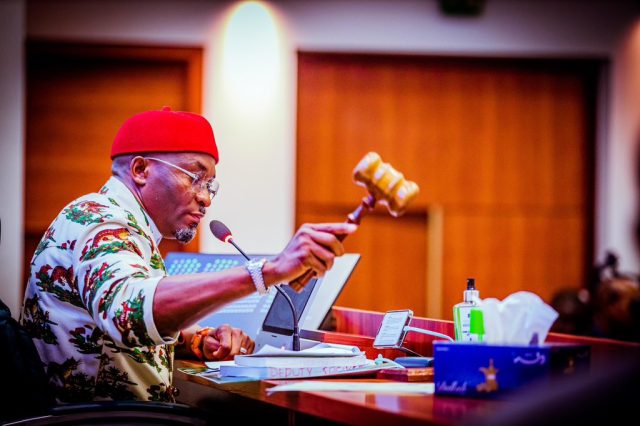Citing concerns and constructive feedback from stakeholders across the country, Deputy Speaker Kalu has withdrawn the indigeneship bill

Deputy Speaker of the House of Representatives, Rep. Benjamin Kalu, has formally withdrawn the contentious indigeneship bill from parliamentary consideration to allow for broader legislative engagements.
Kalu announced the decision in a statement by his Chief Press Secretary, Levinus Nwabughiogu, on Tuesday night, citing concerns and constructive feedback from stakeholders across the country.
He noted that a Bill Analysis Report by the National Institute for Legislative and Democratic Studies (NILDS) also recommended shelving the bill at this time.
The bill, which aimed to foster national unity, equity, and inclusiveness by addressing the rights of settlers in various states, had sparked debate over its broader implications.
NILDS, in its report, emphasised that the responsibility to ensure settlers enjoy equal rights should rest with State Houses of Assembly, suggesting that state-level legislation would be more appropriate.
According to him, the intention of the bill was to promote national unity, equity, and inclusiveness among all Nigerians, regardless of where they reside and that the State Houses of Assembly should make laws that will make settlers in different states enjoy the same rights and privileges by the indigenes.
“States should make laws that would allow settlers to benefit same rights and privileges enjoyed by indigenes without any form of discrimination as rightly provided for in the constitution.
“Though the bill seeks to achieve some commendable objectives, however, this can be achieved through enactment of law. If this bill is passed, it would pose challenges with time especially on the issue of double or multiple indigenship,” the report stated.
Kalu who is the also chairman of the Constitution Review Committee of the House, said that he is committed to ensuring that every legislative proposal reflects the wishes of the people.
“As leaders and Representatives, we remain committed to ensuring that every legislative proposal reflects the aspirations of the people we serve.
“The Constitution Review process remains an open, inclusive, and participatory exercise, and no provision or proposal will be pursued without adequate dialogue and consensus-building.
“I therefore call on citizens to continue engaging constructively with the House Committee on Constitutional Review as we work together to build a more just, united, and prosperous Nigeria”, he said.
About the indigenehip bill
The indigeneship bill (House Bill 2057), which has passed first reading in the House, sought to grant Nigerians who have resided in a state for at least 10 years, or married an indigene of that state for the same length of time, the same rights and recognition as “indigenes” of that state.
The goal was to foster national unity, equity, and inclusiveness by eliminating discrimination against so-called “non-indigenes” and promoting integration.
However, the bill has faced significant opposition and controversy. Critics argue that indigeneity is rooted in ancestry, cultural lineage, and historical ties to the land, not merely residency or marriage.
They say indigeneity cannot be legislated or redefined by such criteria without undermining cultural heritage, traditional institutions, and the federal structure of Nigeria. Opponents believe the bill threatens the identity and rights of indigenous communities, risks sparking ethnic tensions and conflicts, and could lead to multiple or overlapping indigeneship claims that complicate governance and social cohesion.
Several socio-cultural groups, including De Renaissance Patriots Foundation and the Society for Odua Socio-Cultural Renaissance, have warned that the bill could provoke ethnic conflicts and destabilize the country.
The pan-Yoruba group, Afenifere, also warned the bill could aggravate ethnic violence, while some groups like the Ohanaeze Ndigbo Youth Council support it, seeing it as beneficial to marginalized citizens.

